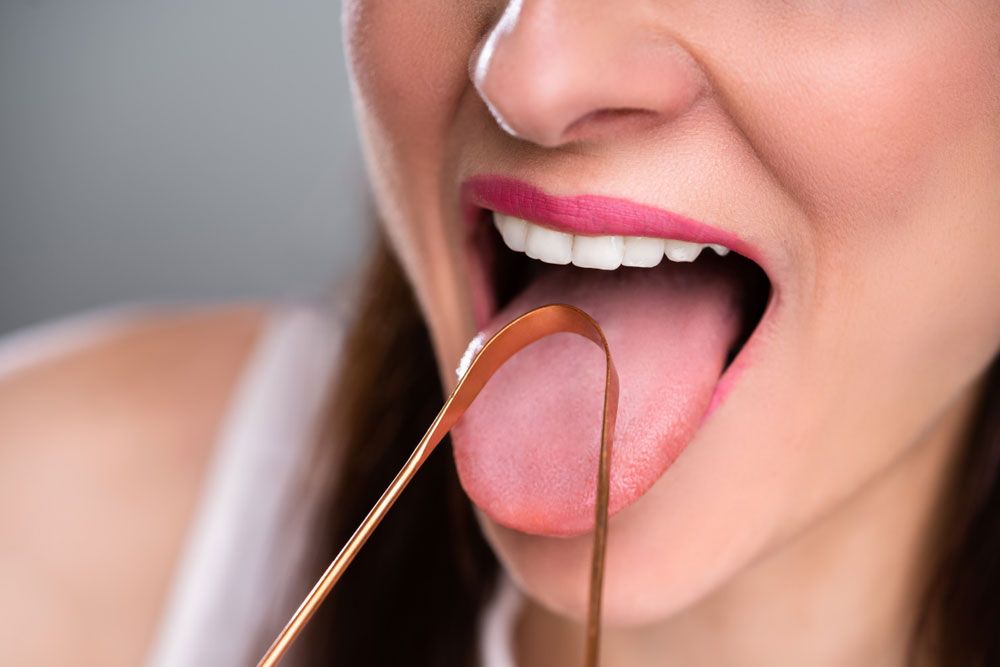Good oral hygiene isn’t just about brushing and flossing your teeth. An often overlooked but equally important part of oral health is cleaning your tongue. The tongue serves as a breeding ground for bacteria, which can contribute to bad breath, gum disease, and even cavities. Cleaning your tongue regularly can help eliminate bacteria, improve your sense of taste, and promote better overall oral hygiene. In this article, we’ll explore the benefits of tongue cleaning and how to do it effectively.
The Role of the Tongue in Oral Health
Your tongue is home to millions of bacteria, some of which are beneficial, but many can contribute to poor oral hygiene and bad breath. The rough texture of the tongue’s surface provides an ideal environment for bacteria to thrive, particularly towards the back of the tongue where food particles and bacteria can accumulate. Over time, if not cleaned properly, this buildup can lead to an increase in harmful bacteria, which may cause problems like tooth decay, gum disease, and persistent bad breath.
Cleaning the tongue helps remove this buildup, providing a fresh feeling in the mouth and reducing the presence of odor-causing bacteria. In addition, it can improve your overall oral hygiene routine, as cleaning the tongue can complement brushing and flossing by targeting areas where bacteria can hide.
The Health Benefits of Tongue Cleaning
There are several reasons why tongue cleaning should be a regular part of your oral care routine:
- Improves Breath Freshness: One of the most noticeable benefits of tongue cleaning is its ability to fight bad breath, also known as halitosis. Bacteria that accumulate on the tongue are a major contributor to foul-smelling breath. By removing these bacteria, you can enjoy fresher breath throughout the day.
- Reduces the Risk of Tooth Decay and Gum Disease: The bacteria that accumulate on the tongue can easily transfer to your teeth and gums, increasing the risk of tooth decay and gum disease. Regular tongue cleaning helps reduce the amount of harmful bacteria in the mouth, improving overall oral health.
- Enhances Taste: When bacteria, food particles, and dead cells accumulate on the surface of the tongue, they can coat taste buds, diminishing your sense of taste. Cleaning your tongue regularly removes this coating, helping you enjoy food with more intensity and clarity.
- Supports Overall Health: Oral health is closely linked to overall health, and poor oral hygiene can increase the risk of various systemic diseases such as heart disease, diabetes, and respiratory issues. By keeping your tongue clean, you are taking a proactive step toward maintaining not only your oral health but also your overall well-being.
How to Properly Clean Your Tongue
Cleaning your tongue is easy, and it should be done as part of your daily oral hygiene routine. Here are a few simple steps to follow for effective tongue cleaning:
- Choose a Tongue Scraper or Brush: Tongue scrapers are specifically designed to clean the surface of the tongue. They are typically made from stainless steel, plastic, or silicone. Alternatively, you can use your toothbrush to clean your tongue, though a dedicated tongue scraper may provide better results.
- Use Gentle Pressure: When using a tongue scraper, gently place the scraper at the back of your tongue and pull it forward towards the tip of your tongue. Use a gentle pressure to avoid damaging the tongue.
- Rinse Thoroughly: After each pass, rinse the tongue scraper under warm water to remove the buildup. Repeat the scraping process until you feel that the tongue is clean.
- Don’t Forget the Whole Tongue: Ensure that you clean the entire surface of your tongue, including the back, where bacteria tend to accumulate the most.
- Incorporate Into Your Routine: Tongue cleaning should be done once a day, ideally in the morning, before eating or drinking, to remove overnight bacterial buildup.
Common Mistakes to Avoid When Cleaning Your Tongue
While tongue cleaning is an easy and effective way to maintain oral health, some common mistakes can make the process less effective or even cause harm:
- Using Too Much Pressure: Scraping the tongue too hard can irritate the delicate tissues on the tongue, leading to soreness or injury. Always use gentle, consistent pressure when cleaning.
- Skipping the Back of the Tongue: The back of the tongue is where most bacteria and debris accumulate, so be sure to clean this area thoroughly.
- Not Cleaning the Scraper: After each use, be sure to rinse your tongue scraper thoroughly to avoid reinfecting your tongue with bacteria.
- Not Brushing After Scraping: It’s important to brush your teeth and floss as usual after cleaning your tongue to ensure all areas of the mouth are fresh and bacteria-free.
Conclusion
Incorporating tongue cleaning into your daily oral hygiene routine offers several benefits, from fresher breath to improved oral and overall health. Regular tongue cleaning helps remove bacteria, enhances your sense of taste, and reduces the risk of tooth decay and gum disease. Make tongue cleaning a part of your routine, and enjoy the lasting benefits of a healthier mouth and fresher breath.
Sources:
Wilson, J. L., & Lee, C. S. (2017). The Impact of Tongue Cleaning on Oral Health and Halitosis. Journal of Dental Hygiene.
Singh, R., & Gupta, P. (2015). Tongue Cleaning and Its Impact on Oral Microflora. International Journal of Dental Hygiene.
Davis, M., & Harris, S. (2020). Tongue Cleaning for Oral Health: A Review of Benefits and Methods. Oral Health Review.

